Videos by Andreas Sommer
Papers by Andreas Sommer
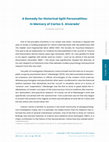
Journal of Anomalous Experience and Cognition
Dissociation (Alvarado, 1989)-this essay had significantly shaped the direction of my own researc... more Dissociation (Alvarado, 1989)-this essay had significantly shaped the direction of my own research on historical cross-links between modern psychology and psychical research from the very start. The path of investigation followed by Carlos himself was first laid out in encyclopedic scope by psychiatrist Henri F. Ellenberger (1970), who demonstrated fundamental omissions and distortions in official chronologies of the modern mind sciences: Whereas psychologists and psychiatrists often seem conditioned to view the historical relation between their disciplines and the "occult" in simplistic terms of a victory of "science" over "superstition," Ellenberger was the first to show in great detail the indebtedness of modern concepts of the subconscious mind to traditions like mesmerism, spiritualism, and psychical research. Of course, not all of Ellenberger's work was specifically concerned with the "paranormal." One could even say he had only begun to scratch the surface in this regard, so there was still plenty of work left for Carlos and the few others who would follow him. Carlos's name is familiar to anyone in the small community of parapsychological investigators today, but it is perhaps not widely known that his research has informed the work of several mainstream scholars. One of the first to draw on Carlos's findings was Harvard historian of science and medicine Anne Harrington (1987), in a major contribution to the history of the neurosciences. Carlos had only started warm
The British Journal for the History of Science, 2011
The relationship between science and its 'occult'siblings is a strange thing. On the on... more The relationship between science and its 'occult'siblings is a strange thing. On the one hand, we find that surprisingly many scientific icons, ranging from Galton, the Curies and Einstein to Gödel, Heisenberg and Pauli, entertained a more than just fleeting interest in 'things ...
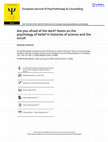
The popular view of the inherent conflict between science and the occult has been rendered obsole... more The popular view of the inherent conflict between science and the occult has been rendered obsolete by recent advances in the history of science. Yet, these historiographical revisions have gone unnoticed in the public understanding of science and public education at large. Particularly reconstructions of the formation of modern psychology and its links to psychical research can show that the standard view of the latter as motivated by metaphysical bias fails to stand up to scrutiny. After highlighting certain basic methodological maxims shared by psychotherapists and historians, I will try to counterbalance simplistic claims of a ‘need to believe’ as a precondition of scientific open-mindedness regarding the occurrence of parapsychological phenomena by discussing instances revealing a presumably widespread ‘will to disbelieve’ in the occult. I shall argue that generalized psychological explanations are only helpful in our understanding of history if we apply them in a symmetrical manner.
Open access PDF at http://www.tandfonline.com/doi/pdf/10.1080/13642537.2016.1170062

Recent research on the professionalization of psychology at the end of the nineteenth century sho... more Recent research on the professionalization of psychology at the end of the nineteenth century shows how objects of knowledge which appear illegitimate to us today shaped the institutionalization of disciplines. The veridical or telepathic hallucination was one of these objects, constituting a field both of division and exchange between nascent psychology and disciplines known as 'psychic sciences' in France, and 'psychical research' in the Anglo-American context. In France, Leon Marillier (1862–1901) was the main protagonist in discussions concerning the concept of the veridical hallucination, which gave rise to criticisms by mental specialists and psychopathologists. After all, not only were these hallucinations supposed to occur in healthy subjects, but they also failed to correspond to the Esquirolian definition of hallucinations through being corroborated by their representation of external, objective events.
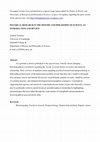
Psychical research in the history and philosophy of science. An introduction and review
As a prelude to articles published in this special issue, I briefly sketch changing historiograph... more As a prelude to articles published in this special issue, I briefly sketch changing historiographical conventions regarding the ‘occult’ in recent history of science and medicine scholarship. Next, a review of standard claims regarding psychical research and parapsychology in philosophical discussions of the demarcation problem reveals that these have tended to disregard basic primary sources and instead rely heavily on problematic popular accounts, simplistic notions of scientific practice, and outdated teleological historiographies of progress. I conclude by suggesting that rigorous and sensitively contextualized case studies of past elite heterodox scientists may be potentially useful to enrich historical and philosophical scholarship by highlighting epistemologies that have fallen through the crude meshes of triumphalist and postmodernist historiographical generalizations alike.
This paper traces the formation of the German “Gesellschaft für psychologische Forschung” (“Socie... more This paper traces the formation of the German “Gesellschaft für psychologische Forschung” (“Society for Psychological Research”), whose constitutive branches in Munich and Berlin were originally founded as inlets for alternatives to Wundtian experimental psychology from France and England, that is, experimental researches into hypnotism and alleged supernormal phenomena. By utilizing the career trajectories of Max Dessoir and Albert von Schrenck-Notzing as founding members of the “Gesellschaft,” this paper aims to open up novel perspectives regarding extra-scientific factors involved in historically determining the epistemological and methodological boundaries of nascent psychology in Germany.

Largely unacknowledged by historians of the human sciences, late-19th-century psychical researche... more Largely unacknowledged by historians of the human sciences, late-19th-century psychical researchers were actively involved in the making of fledgling academic psychology. Moreover, with few exceptions historians have failed to discuss the wider implications of the fact that the founder of academic psychology in America, William James, considered himself a psychical researcher and sought to integrate the scientific study of mediumship, telepathy and other controversial topics into the nascent discipline. Analysing the celebrated exposure of the medium Eusapia Palladino by German-born Harvard psychologist Hugo Münsterberg as a representative example, this article discusses strategies employed by psychologists in the United States to expel psychical research from the agenda of scientific psychology. It is argued that the traditional historiography of psychical research, dominated by accounts deeply averse to its very subject matter, has been part of an ongoing form of ‘boundary-work’ to bolster the scientific status of psychology.

Shortly after the death of Albert von Schrenck-Notzing (1862–1929), the doyen of early twentieth ... more Shortly after the death of Albert von Schrenck-Notzing (1862–1929), the doyen of early twentieth century German parapsychology, his former colleague in hypnotism and sexology Albert Moll (1862–1939) published a treatise on the psychology and pathology of parapsychologists, with Schrenck-Notzing serving as a prototype of a scientist suffering from an ‘occult complex’. Moll’s analysis concluded that parapsychologists vouching for the reality of supernormal phenomena, such as telepathy, clairvoyance, telekinesis and materialisations, suffered from a morbid will to believe, which paralysed their critical faculties and made them cover obvious mediumistic fraud. Using Moll’s treatment of Schrenck-Notzing as an historical case study of boundary disputes in science and medicine, this essay traces the career of Schrenck-Notzing as a researcher in hypnotism, sexology and parapsychology; discusses the relationship between Moll and Schrenck-Notzing; and problematises the pathologisation and defamation strategies of deviant epistemologies by authors such as Moll.
History of Psychiatry, 2011

The English music theorist and philosophical writer Edmund Gurney was the first ‘full-time’ psych... more The English music theorist and philosophical writer Edmund Gurney was the first ‘full-time’ psychical researcher in history. While he was primarily concerned with empirical evidence for telepathy, Gurney significantly contributed to the late nineteenth-century literature on hallucinations in the sane, and the psychology of hypnotism and dissociation.He conducted the first large-scale survey of hallucinations in the general public and, with Pierre Janet, was the first to publish experimental data suggesting dissociated streams of consciousness in hypnotism. This paper sketches Gurney’s contributions to psychology and dynamic psychiatry in the context of his friendship with Frederic W.H. Myers and William James. It is argued that although Gurney’s research into hallucinations and hypnotism had been embraced and assimilated by contemporary psychologists such as William James, Alfred Binet and others, his contributions to psychology have subsequently been marginalised because of the discipline’s paradigmatic rejection of controversial research questions his findings were entangled with.
Book chapters by Andreas Sommer
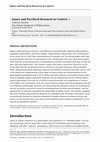
Oxford Handbook of William James, 2020
James's open advocacy, practice, and defense of unrestrictedly empirical approaches to telepathy,... more James's open advocacy, practice, and defense of unrestrictedly empirical approaches to telepathy, mediumship, and other alleged "supernatural" phenomena was a central part of his work, yet it is still often misunderstood or passed over. By placing James back into an international network of contemporary elite intellectuals who were also preoccupied with reported occult phenomena as fundamental scientific anomalies that may or may not have spiritual significance, this chapter argues that James's psychical research can be reconciled with the progressiveness for which his canonical ideas are often regarded. When appreciated within important political and medical contexts of his time, and in view of his long-term collaborations in the study of trance states and hallucinations in non-pathological populations with F. W. H. Myers and other figures connected to Henry Sidg wick in England, James's psychical research was an integral part of his evolving experi mental psychology. Growing out of James's deep discontent with dogmatism in science and religion, his unorthodox work also shared mutual origins with his pragmatist and rad ical empiricist philosophy. Moreover, by illustrating the polemical nature of simultaneous attacks on James's psychical research and pragmatism by fellow psychologists, and the employment of religious arguments by supposedly scientific critics, this chapter suggests the story of James and psychical research is a reminder that "scientific naturalism" as an inconsistently defined yet absolute standard of modern Western academic activity has grown out of concerns that were not as self-evidently science-based or humanistic as we may be accustomed to believe.
A historiographical sketch of the decline of beliefs in 'ghosts' and 'magic' in early modern to m... more A historiographical sketch of the decline of beliefs in 'ghosts' and 'magic' in early modern to modern science. Drawing on existing historical scholarship on science and magic, and my original research on the role of psychical research during the professionalization of modern psychology, I question a fundamental myth of Western modernity by arguing that science had rather little to do with the 'decline of magic'.




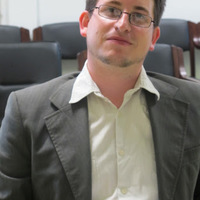


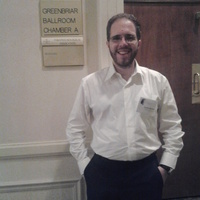
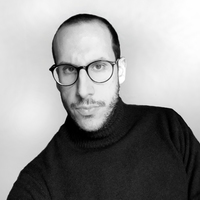
Uploads
Videos by Andreas Sommer
Papers by Andreas Sommer
Open access PDF at http://www.tandfonline.com/doi/pdf/10.1080/13642537.2016.1170062
Book chapters by Andreas Sommer
Open access PDF at http://www.tandfonline.com/doi/pdf/10.1080/13642537.2016.1170062
While Carl du Prel has been rediscovered as a source of inspiration for artists such as Wassily Kandinsky and Rainer Maria Rilke, his importance in the history of mind-body medicine and in the development of concepts of the unconscious still awaits assessment. My research is attempting to close this gap.